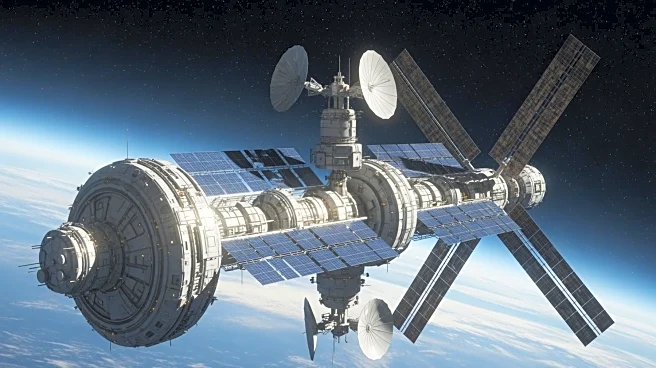What's Happening?
The International Space Station (ISS) is set to be decommissioned and de-orbited in 2030, marking the end of a significant era in space exploration. Since its inception in 2000, the ISS has been a hub
for international collaboration and scientific research, hosting over 4,000 experiments and producing 4,400 scientific papers. Despite its achievements, the ISS has faced criticism for its high costs, with NASA spending $3 billion annually on its maintenance. As the ISS nears its end, discussions are underway about its legacy and the future of space research. Private companies like Axiom Space and Blue Origin are expected to fill the gap with new commercial space stations, but concerns remain about the continuity of open scientific collaboration and data sharing.
Why It's Important?
The decommissioning of the ISS represents a pivotal moment for space exploration and international cooperation. The ISS has been a symbol of peaceful collaboration, bringing together astronauts and scientists from various countries, including those with historically tense relations. Its closure raises concerns about the future of such collaborations, especially in a geopolitical climate that is less conducive to international partnerships. The transition to commercial space stations could lead to a shift in how space research is conducted, potentially prioritizing profit over scientific merit. This change could impact the accessibility of space research data, which has traditionally been open to the global scientific community.
What's Next?
As the ISS approaches its decommissioning, NASA and private companies are working on developing new space stations to continue research in low Earth orbit. These commercial ventures will need to address concerns about transparency and accessibility of research data. The involvement of former NASA personnel in these projects offers some hope for maintaining the legacy of open science. However, the extent to which these new platforms will replicate the international cooperation seen on the ISS remains uncertain. The future of space exploration will depend on how these challenges are addressed and whether new partnerships can be formed in the evolving landscape of space research.
Beyond the Headlines
The end of the ISS era could lead to a reevaluation of what constitutes valuable scientific research in space. The ISS has demonstrated that the process of conducting science in space is as important as the discoveries themselves. This infrastructural knowledge will be crucial for future missions, potentially influencing how new space stations are designed and operated. The shift to commercial space stations may also redefine international participation in space exploration, with countries potentially becoming paying customers rather than equal partners. This could alter the dynamics of global space collaboration and innovation.









